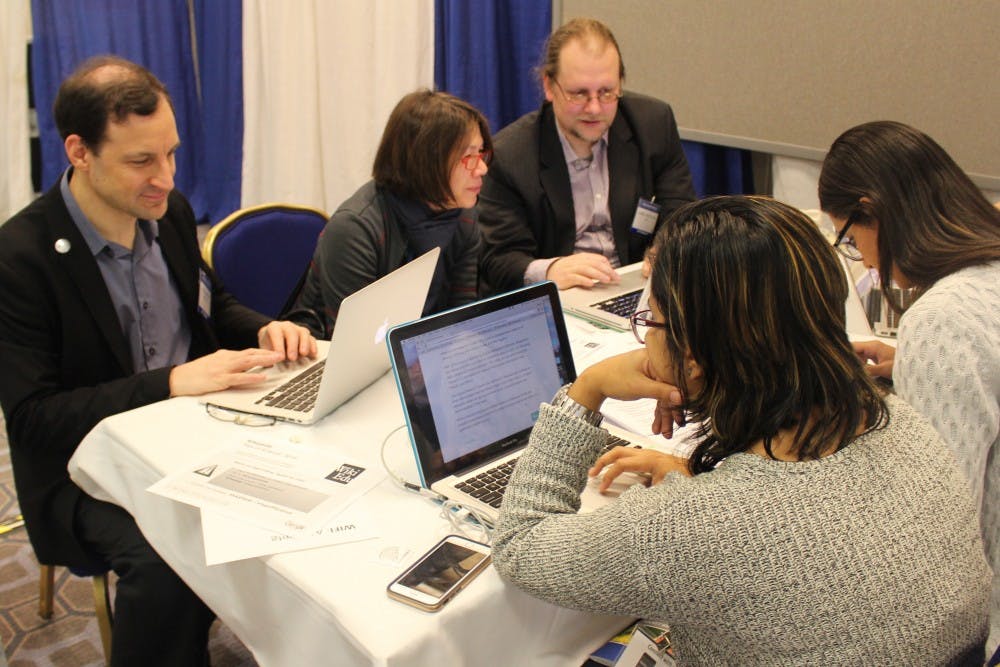STEM apathy culture at Hopkins is the butt of countless jokes and memes. After all, how many times have you avoided eye contact with a student group tabling on the Breezeway on your way to math class? But as funny as it is to make fun of your friend who never leaves Brody for long enough to see the protests on the terrace, STEM students and professors’ relative lack of engagement in social and political activism is a serious problem.
But not all scientists and engineers are unengaged. In fact there is an entire organized community of politically-conscious STEM professionals. They come together through organizations like the American Association for the Advancement of Science (AAAS).
Last weekend I attended the AAAS 2019 Annual Meeting in Washington, D.C. The Annual Meeting is a four-day gathering of professors, leaders of science and technology companies, public administrators in the science policy field, students, and thousands of others who are engaged in science research and advocacy.
The point of bringing this diverse group together is to cultivate a STEM activism culture. It aims to create an environment in which technical experts can be overtly political and pool their knowledge to address a range of societal problems.
The Annual Meeting featured a combination of plenaries, breakout sessions, expositions and special events. Plenary sessions included talks from esteemed members of the scientific community. Breakout sessions included lectures, panels and workshops on a wide variety of topics in scientific theory, experimentation and political and societal applications.
I chose sessions ranging from science diplomacy and North Korea to the (in)feasibility of a U.S.-Mexico border wall to new developments in nuclear fusion technology. Throughout the meeting, agencies and companies from around the world hosted receptions. Research institutions, nonprofits and vendors set up booths to create a walkable science “marketplace.”
This structure is standard for a scientific symposium. However what made the AAAS Annual Meeting different was its explicit inclusion of political issues in scientific discourse.
Instead of presenting pure research, breakout sessions used scientific studies to discuss potential government policy on food insecurity, sustainable development, healthcare and industrial activity. Presenters and attendees openly expressed progressive ideas and their approval or disapproval of national leaders. This is starkly different from other scientific gatherings, where career researchers are hesitant to overstep their bounds and “get political” in a professional setting.
Interestingly, many sessions had little to do with science. In addition to the talk I attended about the border wall, other speakers talked about community organizing tactics, workplace accessibility, gender equity, rights and representation for sexual minorities and tools for discourse with politicians and people of faith.
None of those topics would earn you a Q credit at Hopkins, but they were featured prominently as an important part of a scientist’s continuing education. In fact, a key point of the meeting was to assert that they are essential to the success of scientific research and collaboration. No amount of peer review will make science “good” unless researchers develop a progressive social and political consciousness.
The overarching theme of the meeting was “Science Transcending Boundaries.” Many of the sessions discussed scientific projects that promote international collaboration. This led to some scathing criticism of political regimes, including the U.S. government, who inhibit scientific cooperation through their international policy. Speakers also criticized the U.S. Department of State for refusing to exempt scientists and professors from President Trump’s travel ban. The intensity of political critiques ranged from tepid (relax the travel ban) to more radical (open the borders and end sanctions). However, regardless of their nature, no political critiques were tempered in the interest of remaining “neutral” or “academic.” In fact, scientific progress was seen as a reason to advocate for progressive ideas and to support political opposition.
Hopkins students can learn from organizations like the AAAS. Maybe our investment in STEM — our drive to use math, science and empirical data to discover and implement truths about the world — should give us a reason to engage in progressive politics, not to shy away from them.
So the next time you’re hesitant to participate in a walkout because you would have to miss a physics lecture, remember that political engagement might be just as important to your scientific career as your classroom learning is.





